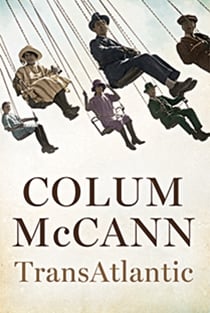McCann writes sentences that create silences. They hover off the page and wrap readers in cocoons of quiet, ushering them through horrors in works that are never horrible themselves. In TransAtlantic, his first novel since the National Book Award-winning Let The Great World Spin, McCann weaves together disparate stories of ocean crossings. Each touches on a grave tragedy (or two or three). But none wallow. Instead, they float just off to the side.
In one thread, two veterans decamp to Newfoundland to plot the first transatlantic flight. In another, a young Frederick Douglass, escaped slave, travels to the Ireland of the potato famine. In the third, George Mitchell, a former U.S. senator, tries to guide the final stages of the Irish peace process. All three are based on real events. But McCann connects them with a fictional spine—a single family spread over generations that itself endures several transatlantic crossings.
Joel Lovell, in a recent New York Times Magazine profile, called Let The Great World Spin the greatest novel to come out of the Sept. 11 attacks. TransAtlantic doesn’t quite meet that standard. The constituent parts, many brilliant, don’t always combine into a perfect whole. And the writing is so restrained that at times the pacing lags.Yet McCann still crafts sentences so beautiful as to be near perfect. Descendants managing an inheritance are “janitors for the ambitions of the dead.” A Dublin sunrise is “dawn unlock[ing] the morning in increments of grey.” The ending, too, is soft and sad and understated—a perfect coda to a book that is all those things.
Visit the Maclean’s Bookmarked blog for news and reviews and all thing literary.
